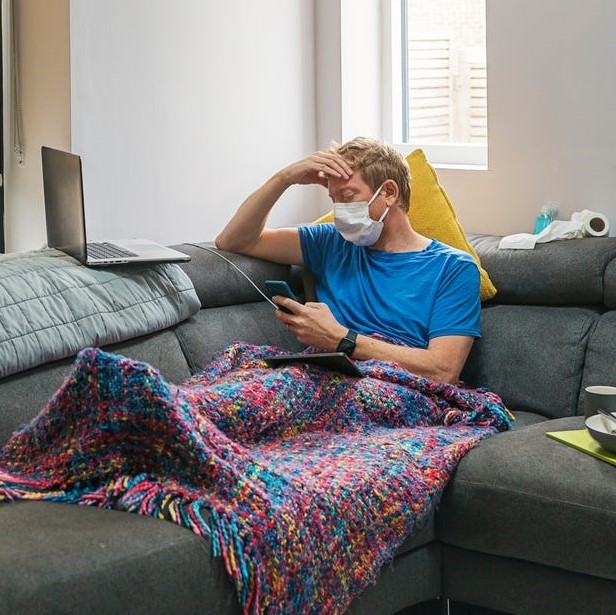Treating Coronavirus at Home
June 13, 2020

Coronavirus continues to be a serious threat and the number of confirmed cases increases daily. Unfortunately, this means that you may find yourself caring for a loved one with COVID-19 at home. It is important to know how to protect yourself and avoid getting sick while still attempting to care for the sick person and meet their needs.
Here are some important dos and don’ts from healthcare professionals to help prepare you if your loved one tests positive or is suspected to be positive for coronavirus.
Notify Doctor
The first thing to do after a positive test or the suspicion of being positive is to notify the person’s healthcare provider. It is important to stay in touch with the doctor for the duration of the illness for appropriate medical advice.
Isolation
The next step is isolation. The patient should stay in a separate bedroom and use a separate bathroom if possible. If the same bathroom must be shared, have the patient clean all surfaces after every use. If the patient is too sick to do the cleaning, wait as long as you can before going in and cleaning it yourself. Opening the windows on the bedroom and bathroom are a good way to increase air circulation and get rid of airborne particles faster.
Fever Treatment
A rising fever is one of the most common symptoms of coronavirus. You should take the patient’s temperature twice a day. Once in the morning as soon as he/she wakes up and then again later in the day when it could be higher. If the patient has a fever, the doctor may recommend which medication to take based on the person’s age and preexisting medical conditions. A warm bath is also a good day to help lower the fever.
Hydration
Fever, vomiting, and diarrhea are all possible symptoms of COVID-19 patients. These may all lead to dehydration so it’s important to make sure the patient is well hydrated. Make sure the patient is urinating frequently and the urine is not dark-yellow, which sometimes indicates dehydration. You can prepare a cooler with water or other drinks and leave it bedside for the patient to have available at all times. Tea, juice, energy drinks, and popsicles are a good alternative if the person does not desire water.
Cough Treatment
Another uncomfortable symptom of coronavirus is a constant dry cough that is very difficult to suppress. Studies show that over-the-counter cough medicine isn’t effective on COVID-19 patients and thus not recommended. Prescription medicines may work and could be prescribed by the patient’s doctor. Anything that lubricates the throat, like hot tea and cough drops in addition to elevating the patient’s head with extra pillows can be helpful; especially at nighttime when coughing can be more present and uncomfortable.
Breathing Exercises
Shortness of breath is also a symptom of coronavirus. If the patient is having trouble breathing or the symptoms are worsening, go to the hospital right away. For patients experiencing mild breathing issues, breathing exercises may help. “In a video demonstrating the technique, British doctor Sarfaraz Munshi tells viewers to take a deep breath, hold it for five seconds and then release it. Patients should repeat this five times, then take the sixth breath in and cough strongly while releasing it. Afterward, they should lie flat on their stomach for 10 minutes, taking slightly deeper breaths than normal.” (www.aarp.org/coronavirus) The exercise will open air pockets push air deep into the lungs, preventing mucus buildup. But remember, if the patient is experiencing severe breathing problems he/she should seek medical attention right away.
Protect Yourself
Clean and disinfect frequently touched items and surfaces at least once a day. These can include doorknobs, light switches, handles, faucets, and electronics. Also, wash your hands frequently and if possible, use disposable paper towels to dry them while someone at home is sick. Both you and the patient need to wear a mask if you are within six feet of each other. It’s also recommended to wear a mask and gloves when you need to collect and wash the patient’s dishes or laundry. This should be done in hot water and separately from the rest of the family’s.
Worsening Conditions
Coronavirus symptoms may peak in 8-10 days in many patients. The majority of patients with COVID-19 can recover at home without medical care or complications but it’s important to watch for signs that a trip to the hospital is necessary. “Go to the hospital or call 911 if your family member exhibits any of the following warning signs: trouble breathing; persistent pain or pressure in the chest; bluish lips or face; fainting; or stroke symptoms such as confusion, weakness on one side or trouble focusing.” (www.aarp.org/coronavirus)
Caring for someone with coronavirus can be stressful and overwhelming while you worry about your loved one’s wellbeing and your own. It’s very important to take the necessary safety precautions so you can be there for them physically and emotionally while also protecting yourself.